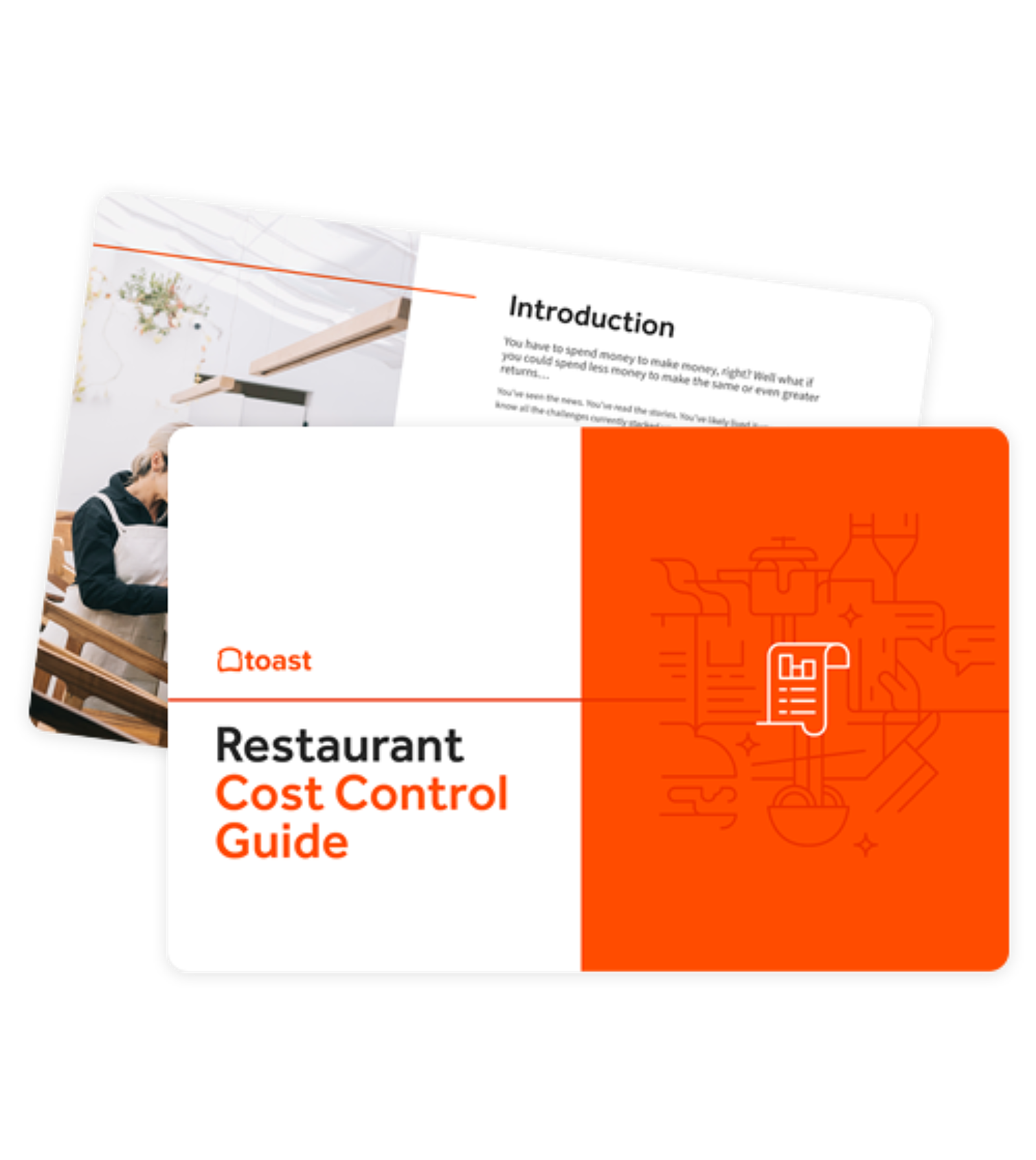
Bakery Accounting Guide: Bookkeeping Tips for Bakery Operators
Understand the critical components required for a successful accounting and bookkeeping program at your bakery.

Nick PerryAuthor


Restaurant Cost Control Guide
Use this guide to learn more about your restaurant costs, how to track them, and steps you can take to help maximize your profitability.
Get free downloadFood Truck Accounting: Bookkeeping Tips for Food Truck Businesses
It’s important for businesses to keep stringent accounting records in order to understand financial health and remain compliant with taxes and bills — especially for restaurant accounting, where the average profit margin is just 3-5 percent.
Although bakeries enjoy a slightly higher average profit margin (up to 6.5%), bakery accounting is no less essential. Good accounting practices help control costs, keep track of operational finances, and ensure bakeries are on track for financial goals.
Read on to learn accounting practices to help new and experienced bakery operators manage the books.
Bakery accounting 101
Let’s first define the differences between bakery accounting and bakery bookkeeping.
Bakery bookkeeping
Bookkeeping focuses on recording and organizing financial data — the day-to-day number punching that illustrates how much a bakery spends versus how much revenue it makes.
Bakery accounting
Accounting is the interpretation and presentation of that data to make larger inferences, draw insights, and take action with a financial plan.
The two ideas are closely related, as the quality of day-to-day restaurant bookkeeping will have a direct impact on longer term accounting practices and insights.
The end goal of it all — bookkeeping and accounting — is to enable operators to make more informed decisions that will encourage greater long-term growth and profitability.
Bakery business accounting considerations
Bakeries have a number of specific accounting concerns to take into consideration, including:
Payroll: Depending on the size of the operation, a bakery may have a very large staff. That can lead to scheduling challenges and also make managing payroll complicated.
Tip handling: Tipping has become even more normalized at takeout businesses, and operators must consider how to distribute tips to staff and avoid treating these incomes like profit.
Inventory management: Inventory is a crucial element of all restaurants, directly factoring into the bottomline. Effective inventory management can help improve batch costing, optimize menu prices, save money through dry ingredient hold-overs, and more.
Cash flows: Bakeries need cash to order supplies, pay employees, and manage operational expenses. Good accounting can help businesses stay on top of supplier costs and prepayments in order to make rent and payroll each period.
P&Ls: Profit and loss statements are some of the most important accounting statements for any business.
Outsourced vs. in-house bakery accounting
There’s no right answer between hiring an accountant to manage a bakery’s books vs relying on outsourced services. There are pros and cons to each. It ultimately depends on each bakery’s unique business needs.
Pros of an in-house accountant
Close personal knowledge of the business: An in-house accountant is probably in the bakery at least a few times a week. As such, they get an idea of how it functions in reality rather than just what the business looks like from a numbers standpoint. As such, they can be great resources for identifying waste and cost control opportunities that may be overlooked.
Quality assurance: Working closely with an in-house accountant raises expectations. Owners, operators, and managers can readily audit their work, ask questions, and make sure things look right with ease.
Easy feedback loop: Relatedly, an in-house accountant will be easy to reach and will likely have a convenient working relationship with staff.
Cons of an in-house accountant
Expensive: The major drawback of an in-house accountant is cost. Bakeries may be able to find one willing to work hourly, just like any other full-time employee, a full-time accountant may likely expect salary and benefits.
Overwork: Running the books for a bakery could be very hard work, and relying on a single accountant could put undue pressure on them.
Pros of an outsourced accountant
Budget-friendly: Businesses outsource accounting services to better manage the cost vs a full-time, in-house CPA. Many restaurant accounting services offer customizable plans, whether it’s for financial reporting to check the box up to more full-scale, detailed accounting.
Flexibility: Accounting services may assign an entire team to service a restaurant’s needs, meaning someone can always be around to answer questions — and specialists may be able to deep dive on their particular areas of focus.
Cons of an outsourced accountant
Effort: Outsourced accountants working with multiple clients may need to continually ramp up each time they engage with a client’s business.
Lack of personal touch: While not always the case, it’s common for outsourced accountants to stay between the lines of their contract rather than push the boundaries of a bakery’s potential.
Which accounting method is right for bakery businesses?
There are three primary accounting methods: cash method, accrual method, and modified cash-basis accounting.
The Internal Revenue Services (IRS) requires accrual accounting for businesses making an average of $25 million or more in sales, but most restaurants use cash accounting or some version of modified cash-basis accounting.
Bakeries most likely use cash accounting considering most revenues incur from customers paying at the counter and expenses don’t take significant time to hit the books.
Beyond the accounting method, operators need to know which financial statements need to be maintained. A bakery’s financial plan should stem from an overall business plan, and will include three primary financial reports: the income statement, balance sheet, and cash flow statements.
Income statements are basically P&Ls, which we covered before, and should be kept up to date daily with all of a bakery’s incomes and expenses. The balance sheet tracks assets, liabilities, and equity which may evolve over time — including larger items like owned real estate, major equipment owned or leased, and debts to lenders or shareholders. Finally, the cash flow statement illustrates how money comes into and flows through the business in the form of expenses.
A bakery accountant and/or bakery accounting software can help make sense of these statements and keep them up to date.
How to pick your bakery accountant
Here are some things to consider if going with a bakery accountant.
Accountant affiliation
Determine your budget and desired relationship with an accountant. This can help dictate whether to choose an independent accountant or hire an accounting firm.
Accounting requirements
Do you need a full-time accountant or will part-time do? There’s a bit of calculus here. Freelance accountants or firms generally charge by the hour, so the more you need them, the more you’ll pay. But if you hire a firm, you’ll also pay more per hour for more experienced accountants.
As such, if you’re using a large firm for your bakery accounting with many accountants, you may want to assign simple tasks to more junior, less expensive accountants, and more complex ones to senior accountants. Things like invoice processing are fine for a junior accountant, while more complicated and important projects like calculating plate costs are better for senior accountants.
Specialization
There are many accountants who work with restaurants, but bakeries aren’t exactly the same as a restaurant. As such, it’s important to find an accountant with bakery accounting experience. There are different processes and key performance indicators (KPIs) in a bakery than there are in a white tablecloth restaurant. Your accountant’s experience and industry knowledge should reflect that.
Software familiarity
You can always choose to use both an accounting software and an accountant. Most all accountants these days are using restaurant accounting software — in fact, it’d be a red flag if they weren’t.
If you’re already using accounting software but still want to bring in an accountant, make sure they know how to use your bakery accounting software so you don’t have to pay someone to train them.
Pro tip: There are many QuickBooks Pro Advisors working in the restaurant industry.
How to pick a bakery accounting software
As we just mentioned, many accountants will still use accounting software. As such, you can employ a bakery accounting software before bringing in an accountant. When you’re shopping, consider the following:
Needs: Whether you want to automate invoices, perform recipe costing, or you just need a program to pump out financial reports, a bakery accounting software should check all these boxes. The best options will support both your annual accounting and day-to-day bookkeeping needs.
Budget: Most bakery accounting software is like accountants: you can pay for different plans. The more you pay, the more you get.
Complexity: If you’re hiring an accountant who knows the software well, you may not worry about complexity. But if you’re trying to do it yourself, you’ll want a bakery accounting software that’s easy to use.
Flexibility: The best accounting software is cloud-based and mobile-friendly so you can access it absolutely anywhere.
A tool like Toast, the point-of-sale system built for restaurants, can help make bakery bookkeeping easier with built-in automations — especially when paired with xtraCHEF by Toast’s invoice automation. Together, these systems can help track the flow of money from supplier and ingredient costs, to strategic menu pricing, revenue, payroll, and more.
This consistent, accurate day-to-day monitoring can add up overtime to help bakery accounting practices unlock insightful reports into financial health and visualize forecasts and potential earnings.
Restaurant Invoice Automation Guide
Use this guide to learn more about your restaurant invoices, the value within, and how to consistently and accurately tap into it to make smarter decisions.

Is this article helpful?
DISCLAIMER: This information is provided for general informational purposes only, and publication does not constitute an endorsement. Toast does not warrant the accuracy or completeness of any information, text, graphics, links, or other items contained within this content. Toast does not guarantee you will achieve any specific results if you follow any advice herein. It may be advisable for you to consult with a professional such as a lawyer, accountant, or business advisor for advice specific to your situation.
Read More
Subscribe to On the Line
Sign up to get industry intel, advice, tools, and honest takes from real people tackling their restaurants’ greatest challenges.


